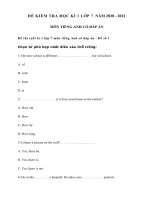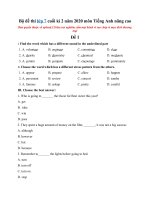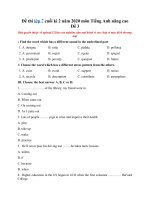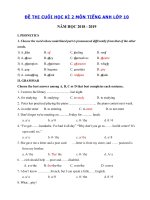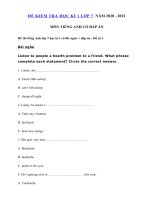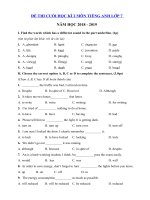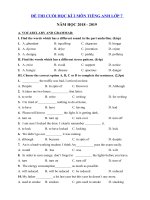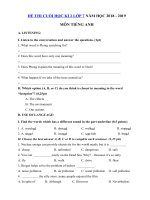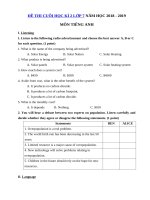Đề cương Tiếng Anh lớp 7 học kì 2 có đáp án
Bạn đang xem bản rút gọn của tài liệu. Xem và tải ngay bản đầy đủ của tài liệu tại đây (281.07 KB, 23 trang )
<span class='text_page_counter'>(1)</span><div class='page_container' data-page=1>
<b>ĐỀ CƯƠNG ƠN THI HỌC KÌ 2 LỚP 7 MÔN TIẾNG ANH</b>
<b>A. LÝ THUYẾT</b>
<b>UNIT 7 TRAFFIC</b>
<b>1. IT indicating distance </b>
Sử dụng “it” làm chủ ngữ để chỉ khoảng cách
Ex: It is about 300 meters from my house to the bus stop.
<b>2. Used to </b>
Sử dụng “used to” để mơ tả một hành động, một thói quen hoặc một việc xảy ra thường
xuyên trong quá khứ nhưng bây giờ khơng cịn nữa
<i>(+) S + used to + V (nguyên mẫu)</i>
<i>(-) S+ did not used to + V (nguyên mẫu)</i>
<i>(?) Did + S + use to + V (nguyên mẫu)</i>
<b>3. Pronunciation/e/ và/ei/</b>
<b>Lưu ý</b>
Say/sei/ Says/sez/ Said/sed/
<b>UNIT 8 FILMS</b>
<b>1. Tính từ “ed” và “ing”</b>
Một tính từ có thể được thành lập bằng cách thêm “ed” hoặc “ing” sau động từ
Ví dụ
Interest -> interested, interesting
Disappoint -> disappointed, disappointing
- Sử dụng tính từ đi “ed” để mô tả cảm giác, cảm xúc của một ai khi bị một sự việc, vật
tác động/
</div>
<span class='text_page_counter'>(2)</span><div class='page_container' data-page=2>
The film was long, and I was bored.
(Bộ phim tác động làm tơi có cảm giác buồn chán)
- Sử dụng tính từ đi “ing” để mơ tả về tính chất của vật việc
Ví dụ
The film was boring.
<b>2. Từ nối ALTHOUGH, DESPITE/INSPITE OF, HOWEVER, NEVERTHELESS</b>
<b>Mặc dù</b>
<i>Although/ though/ even though/ much as + mệnh đề</i>
<i>Despite/ in spite of + cụm danh từ</i>
<b>Tuy nhiên</b>
<i><b>Mệnh đề. However/ Nevertheless,(dấu phẩy) mệnh đề</b></i>
<b>3. Phát âm khi thêm “ed” sau động từ</b>
<i>/t/ sau các âm vô thanh /ʧ/,/s/,/k/,/f/,/p/,/θ/,/∫/ </i>
<i>/d/ sau các âm hữu thanh</i>
<i>/id/ sau/t/,/d/</i>
<b>UNIT 9 FESTIVALS AROUND THE WORLD</b>
<b>1. Câu hỏi với H/ WH </b>
Các từ để hỏi Who, Why, Which, Whose, What, When, Where, How
1. DÙNG VỚI ĐỘNG TỪ “ TOBE”
WH+ BE +S + COMPLEMENT?
BE TUỲ THEO THÌ, COMPLEMENT CĨ THỂ KHƠNG CĨ.
EX: What are you doing?, where is she?, when were we silent?...
2. DÙNG VỚI ĐỘNG TỪ THƯỜNG.
WH + DO, DOES/ DID+ S + V-inf?
EX: Where do you go?, What does she study?, When did they begin?...
3. ĐỐI VỚI CÁC THÌ HỒN THÀNH
WH + HAS, HAVE/ HAD +S +V3/ED?
</div>
<span class='text_page_counter'>(3)</span><div class='page_container' data-page=3>
4. ĐỐI VỚI “ MODAL VERBS” HAY WILL, SHALL, WOULD, SHOULD (May, can,
must, could, might, ought to, have to là modal verbs)
WH + MODAL VERBS + S + V-inf?
EX: Why must you go?, where may she come?, what can she do?, What will she do?...
5. HOW
How much + N(khơng đếm được ln ở số ít) EX: how much money have you got?
How many +N(đếm được ở số nhiều) EX: how many students are there in your class?
How far: bao xa, how long: bao lâu, how often: mấy lần, thường không, how old: bao
nhiêu tuổi……
<b>2. Cụm trạng ngữ</b>
Sử dụng các cụm trạng ngữ chỉ thời gian, nơi chốn, mục đích để làm rõ nghĩa của câu.
- Cụm trạng ngữ chỉ thời gian: Last December, every year..
- Cụm trạng ngữ chỉ nơi chốn: In HCMC, at home…
- Cụm trạng ngữ chỉ much đích: to say thanks for what they have
- Cụm trạng ngữ bổ sung: with apricot blossoms.
<b>3. Pronunciation: 2 syllables </b>
Danh từ, tính từ: nhấn âm 1/ Động từ: nhấn âm 2
<b>UNIT 10: SOURCES OF ENERGY </b>
<b>1. Thì tương lai tiếp diễn</b>
Diễn tả một sự việc ĐANG xảy ra tại một thời điểm xác định trong TƯƠNG LAI
<i>(+)S + will be+ V-ing</i>
<i>(-) S+ will not/ won’t be + V-ing</i>
<i>(?) Will + S + be + V-ing?</i>
<b>2. Bị động của thì tương lai đơn</b>
</div>
<span class='text_page_counter'>(4)</span><div class='page_container' data-page=4>
<i>- Sử dụng thể bị động khi tân ngữ của câu không quan trọng hoặc không biết ai là người</i>
<i>thực hiện hành động, nếu người thực hiện vẫn quan trong thì thêm sau “by”</i>
<i>- Sử dụng thể bị động khi muốn nhấn mạnh vật, việc được tác động.</i>
<b>3. Pronunciation 3 syllables</b>
<b>UNIT 11: TRAVELLING IN THE FUTURE </b>
<b>1. Will (review)</b>
Sử dụng will để đưa ra một dự đoán trong tương lai.
<b>2. Đại từ sỡ hữu</b>
Subject
Pronouns
I YOU WE THEY HE SHE IT
Possessive
Adjectives
MY YOUR OUR THEIR HIS HER ITS
Possessive
Pronouns
MINE YOURS OURS THEIRS HIS HERS ITS
Đại từ sở hữu dùng để thay thế cho tính từ sở hữu và danh từ khi không muốn lặp lại danh
từ.
Ex: It’s my book ===> It’ s mine. (= my book)
----They' re her keys ===> They' re hers. (= her keys)
Như vậy ta phải nói danh từ đó trước rồi mới thay thế.
<i>Lưu ý, vì đại từ sở hữu đã thay thế danh từ nên sẽ khơng bao giờ có danh từ sau đại</i>
<i>từ sở hữu. </i>
Ex: My father is tall. Theirs (= their father) is short.
<b>2. Ngữ điệu trong câu hỏi</b>
Câu hỏi Yes/ No: Lên giọng ở cuối câu.
Câu hỏi H/ WH: hạ giọng ở cuối câu.
Câu hỏi đuôi: hạ giọng cuối câu đề tìm kiếm sự đồng tình
Lên giọng ở cuối câu để hỏi
</div>
<span class='text_page_counter'>(5)</span><div class='page_container' data-page=5>
<b>1. So sánh số lượng: Little -> less Few -> Fewer Many ,much -></b>
<b>more</b>
<b>Số lượng Ít hơn:</b>
<i>S+ V+ less + N (không đếm được)</i>
<i>S+ V+ fewer + N (đếm được)</i>
<b>Số lượng nhiều hơn:</b>
<i>S+ V+ more (danh từ đếm được và không đếm được)</i>
<b>2. Câu hỏi đuôi</b>
Lưu ý:
1. Câu giới thiệu khẳng định, phần hỏi đuôi phủ định.
Câu giới thiệu phủ định, phần hỏi đuôi khẳng định
2. Phần đuôi chỉ sử dụng các đại từ: I, you, we, they, he, she, it, there
3. Phần đuôi luôn ở dạng viết tắt
<b>Các trường hợp cụ thể</b>
<i> Hiện tại đơn với TO BE: </i>
- he is handsome, is he? = Anh ấy đẹp trai, đúng không?
– You are worry, aren’t you? = Bạn đang lo lắng, phải không?
<i>Hiện tại đơn động từ thường: mượn trợ động từ DO hoặc DOES tùy theo chủ ngữ</i>
- They like me, don’t they?/– she loves you, doesn’t she?
<i>Thì quá khứ đơn với động từ thường: mượn trợ động từ DID, quá khứ đơn với TO BE:</i>
<i>WAS hoặc WERE: </i>
- He didn’t come here, did he?/– He was friendly, was he?
<i>Thì hiện tại hoàn thành hoặc hiện tại hoàn thành tiếp diễn: mượn trợ động từ HAVE hoặc</i>
<i>HAS </i>
- They have left, haven’t they?/– The rain has stopped, hasn’t they?
<i>Thì tương lai đơn</i>
- It will rain, won’t it?
<b>3. Nhấn âm (review) 5 NGUYÊN TẮC – 2 LƯU Ý</b>
</div>
<span class='text_page_counter'>(6)</span><div class='page_container' data-page=6>
Động từ: 2nd
Nếu động từ tận bằng các ấm “ngắn” và “nhẹ”: ow, el, er… thì nhấn âm cịn lại
<b>2. NGUN TẮC 2: 3 âm tiết</b>
Danh từ, tính từ: 1st
Động từ:
Các động từ 3 âm tiết có âm tiết cuối chưa nguyên âm dài hoặc nguyên âm đôi hoặc kết
<b>thúc nhiều hơn một phụ âm thì âm tiết đầu nhận trọng âm.</b>
Nếu âm tiết cuối chứa nguyên âm ngắn ow, el, er… hoặc kết thúc khơng nhiều hơn một
<b>ngun âm thì âm tiết thứ 2 sẽ nhận trọng âm.</b>
<b>3. NGUYÊN TẮC 3: Từ ghép</b>
Danh từ, tính từ: 1st
Động từ: 2nd
<b>4. NGUYÊN TẮC 4: từ 3 âm tiết trở lên</b>
Nhấn âm thứ 3 từ sau tính đến trước.
<b>5. NGUYÊN TẮC 5: HẬU TỐ.</b>
Các từ chứa các hậu tố sau đây âm nhấn rơi vào âm trước nó.
<b>1. ic</b>
<b>2. ical</b>
<b>3. sion</b>
<b>4. tion</b>
<b>5. aphy</b>
<b>6. ogy</b>
<b>7. ity</b>
Economic
Economical
Succession
Suggestion
Photography
Biology
Able ->
ability
<b>8. acy</b>
<b>9. ian</b>
<b>10. id</b>
<b>11. ible</b>
<b>12. ish</b>
<b>13. tial</b>
<b>14. ious</b>
Democracy
Musician
Stupid
Possible
Foolish
Confidential
hilarious
<b>LƯU Ý </b>
<b>Lưu ý 1: các hậu tố không ảnh hưởng đến</b>
<b>âm nhấn của từ:</b>
<b>Lưu ý 2: các hậu tố nhấn trọng âm</b>
</div>
<span class='text_page_counter'>(7)</span><div class='page_container' data-page=7>
5. D
6. En
7. Ment
8. Full
5. Ese
6. Ette
7. Esque
8. End
9. Ique
10. Mental
<b>B. LUYỆN TẬP</b>
<b>ĐỀ 1:</b>
<b>A. VOCABULARY AND GRAMMAR</b>
<b>PART I: Find the words which has a different sound in the part underline(0,5)</b>
6. A. wanted B. excited C. stayed D. visited
7. A. ahead B. instead C. seat-belt D. bread
<b>PART III: Choose the correct option A, B, C or D to complete the sentences.(1,5)</b>
8. Nuclear energy can provide electricity for the world needs, but it is __________
A. cheap B. unlimited C. dangerous D. safe
9.You can ___________easily on the Dead Sea. Why? – Because it’s so salty
A. fly B. walk C. drive D. float
10. Biogas helps solve the problem of indoor ___________.
A. noise pollution B. air pollution C. water pollution D. soil pollution
11.In the future most people will travel __________ flying train.
A. in B. to C. on D. at
12.Do you think we __________ driverless car in the future?
A. use B. to use C. will use D. have used
13.That picture is __________
A. us B. ours C. our D. we
<b>B. READING</b>
<b>PART I: Read the passage and tick () True or False. (1,5)</b>
</div>
<span class='text_page_counter'>(8)</span><div class='page_container' data-page=8>
gives you pictures and sound. You ride a motorcycle and it is energy that gives you
movement. You cook your meals and it is energy that gives you heat to boil rice.
The problem is that the demand for energy is rising and that the price of energy is getting
higher and higher. The supply of energy on earth is limited. It can not provide us forever.
The shortage of energy in the future is inevitable. Therefore, saving energy is a must if we
want to continue to live in a safe and sound world. (familiar: thân thuộc/ demand: nhu cầu/
inevitable: chắc chắn xảy ra)
<b>True or False?</b> <b>True</b> <b>False</b>
14. Many people aren’t interested in the problems of energy
15. The word “energy” is familiar and close to everyone’s daily life.
16.. Energy is heard, said, discussed day after day.
17. We can’t watch TV without energy.
18. The supply of energy on earth is unlimited. It can provide us forever.
19. If we want to continue to live in a safe and sound world, we have to
save energy
<b>PART II: Read the passage again and answer the questions (0,5)</b>
20..How is the price of energy nowadays?
……….
21.What should you do to save energy at home?
………..
………..
<b>C. WRITINING</b>
<i><b>PART I: Rewrite the sentences so that they have the same meaning as the original ones.</b></i>
<b>(0.5)</b>
22.We will use renewable energy in the future
=> Renewable energy ……….………
23. This is our school
=> This school is ………..……….…
<b>PART II: Rearrange the words to make meaningful sentences (1,5)</b>
24. Solar energy/ in the world/ by many countries/ will be used/.
=> ……… ………..……
25. to another/ How/ you travel from/ will/ one place/?
</div>
<span class='text_page_counter'>(9)</span><div class='page_container' data-page=9>
26. to save/ will reduce/ our energy/ the use of electricity/ We/.
=>………..………
<b> ĐỀ 2:</b>
<b>Language focus </b>
<b>I. Choose the word whose underlined part is pronounced differently from that of the</b>
<b>other words in each group. (1pt) </b>
1. A. teenager B. together C. guess D. regular
2. A. meat B. reader C. sea D. realize
3. A. horrible B. hour C. hundred D. hold
4. A. much B. drug C. future D. buffalo
5. A. serious B. symptom C. sugar D. sauce
<b>II. Choose the best option to complete the following sentences. (1pt)</b>
1. I have known her………..two years.
A. with B. for C. since D. in
2. He ... many old books for 5 years.
A. recycled B. is recycling C. has recycled D. will recycle
3. To prepare for the New Year, I ... my house again since last month.
A. paint B. painted C. have painted D. has painted
4. They ………..the used plastic bottles with water several times yesterday.
A. washed B. is washed C. are washed D. were washed
5. It is dangerous ... quickly.
A. driving B. drove C. to drive D. driven
<i><b>III. A. Match the health problem with its tip. (2pts)</b></i>
A
(1)I’m so tired. __
(2)I have spots. __
(3) I want to stay in shape. What will I
do? __
(4) It’s easy to get flu. What should I do
to avoid it? __
(5)I feel weak and sick. __
B
(A) Do more exercise.
(B) Go to bed and rest.
(C)Watch more TV.
(D)Wash your face regularly.
(E) Keep your body warm and eat lots of
garlic.
(F)Eat more, and get more exercise too.
<i><b>B. Complete the sentences with the words given. </b></i>
<i><b> </b></i>
<b> and but by because for less more or so</b>
(6) People in the countryside have less stress, . . . they usually live longer.
</div>
<span class='text_page_counter'>(10)</span><div class='page_container' data-page=10>
(8) Don’t read or study when there’s not enough light . . . it is harmful for your eyes.
(9) The Japanese eat a lot of rice, . . . they eat a lot of fish too.
(10) Do . . . exercise and you will feel fitter and healthier.
<b>Part III: Reading . (2 pts)</b>
The first reason why many families do volunteer work is that they feel satisfied and
proud. The feeling of fulfillment comes from helping the community and other people. In
addition, volunteering is a great way for families to have fun and closer. But many people
say they don’t have time to volunteer because they have to work and take of their families.
If that’s the case, try rethinking some of your free time as a family. You could select just
one or two projects a year and make them a family tradition. For instance, your family can
make and donate gift blankets for the old homeless people on holidays. Your family can
also spend only one Saturday morning a month collecting rubbish in your neighborhood.
<b>I.</b> <b>Read the text and tick True (T) or False (F)</b>
1. People often feel satisfied and proud when they volunteer
2. All people don’t have time to volunteer
<b> II. Answer the questions </b>
3. How can your family benefit from doing volunteer?
………
4. How can your family help the old homeless people?
………
<b>Part IV: Writing (2pts)</b>
<b>I.</b> <b>Rewrite or combine the sentences, using the suggested words </b>
<b>1. I was tired last night. I stayed up late to watch a game show (Although)</b>
- Although ...
2. Ho Chi Minh City is larger than Ha Noi (smaller)
- Hanoi is ...
<b>II. Rearrange these cued words to make completed sentences: </b>
1. more/ ,but/ usual time/ try/ the/ Sleep/ wake up/ to/ at/.
à………..………..
2. with/ Be/ you/ eat/ what/ careful/ drink/ and/.
(………..………..
<b>ĐỀ 3: </b>
<b>I. Find the word with the different underlined sound.</b>
<b>1. A. washed B. needed C. danced D. matched</b>
</div>
<span class='text_page_counter'>(11)</span><div class='page_container' data-page=11>
<b>2. A. obey B. key C. grey D. survey</b>
<b>3. A. ways B. days C. says D. stays</b>
<b>II. Find the word which has a different stress pattern from the others. (0,5 marks)</b>
4. A. common B. happy C. complete D. joyful
5. A. dangerous B. expensive C. enormous D. convenient
<b>III. Choose the correct option A,B,C,D to complete the sentences.</b>
6. The film was so boring . . . , Jack saw it from beginning to end.
A. Therefore B. However C. Although D. Despite
7. I . . . go on foot when I was in primary school.
A. have to B. used to C. can D. may
8. Does your bike ever . . . down on the way to school?
A. break B. take C. do D. turn
9. The boys. . . home for lunch because they are planning to visit the hydro-power
station.
A. have not come B. do not come C. will not be coming D. is not coming
10. Will you . . . a taxi or a train?
A. drive B. fly C. walk D. take
11. . . the film is a bit frighting, I really enjoyed it.
A. However B. Nevertheless C. Although D. Despite
12. We will go on holiday with some friends of . . . . .
A. our B. ours C. us D. we
13. Don't read in bed, . . . you'll harm your eyes.
A. or B. and C. but D. so
14. I . . . playing board games interesting because I can play them with my friends.
A. think B. find C. say D. tell
15. Before moving to Hanoi, my parents . . . in Hai Phong.
A. have lived B. lived C. live D. have been living
16. My friend has decided to use . . . electricity by using more solar energy instead.
A. more B. less C. much D. fewer
17. Have you got . . . butter in your fridge?
A. any B. a lot C. an D. a
18. A new university . . . in my town in the near future.
</div>
<span class='text_page_counter'>(12)</span><div class='page_container' data-page=12>
A. Thank you B. All right C. Listen D. Excuse me
20.The city will have to find a solution to reduce traffic jam, . . . ?
A. does it B. won't it C. will it D. doesn't it
<b>IV. Read the passage and choose the correct answer.</b>
Easter is an important Christian festival and holiday. It is (21) . . . to celebrate the
resurrection of Jesus Christ.People celebrate Easter (22) . . . the world.
In the UK, Easter is a public holiday. People (23) . . . Easter chocolate eggs to their
friends and family. In the US, Easter is a (24) . . . holiday. People can go to church and
have a special family meal. In Russia, Easter is one of the (25) . . . . important holidays.
People celebrate it (26) . . . an Easter breakfast or meal.
21. A. made B. held C. given D. opened
22. A. through B. in C. all D. around
23. A. eat B. have C. give D. receive
24. A. nation B. local C. native D. national
25. A. more B. best C. most D. better
26. A. with B. by C. for D. in
<b>V. Rewrite the sentences so that it stays the same meaning.</b>
27.The distance from Ho Chi Minh city to Phu Quoc Island is about 300km.
It is ...
28. Road users should obey traffic rules strictly.
Traffic rules ...
29. Be careful or you'll hurt yourself.
If you are ...
<b>VI. Rearrange the words to make meaningful sentences.</b>
30. this time tomorrow/ English/ They/ will/ be learning.
31. doesn't like/ ice-skating/ because/ my brother/ dangerous/ he/ it is/ thinks.
32. people/ until/ flying cars/ use/ won't/ year 2050.
<b>VII. Listening(2 marks)</b>
<b>1. Listen to the recording and circle the appropriate answer.</b>
33. Chu Van An was born in...
A. Thanh Xuan district B. Thanh Ba district C. Thanh Tri district
34. He passed the ...
</div>
<span class='text_page_counter'>(13)</span><div class='page_container' data-page=13>
A. worker B. teacher C. doctor
36. He died in ...
A. 1370 B. 1373 C. 1337
<b>2. Listen to the passage again and write short answers to the questions below.</b>
37. When was Chu Van An born? . . . .
38. What was he like? . . . .
39. What did he do later in his life? . . . .
40. How old was he when he died? . . . .
THE END
<b>-ĐỀ 4</b>
<b>Question I. Find the word which has different sound in the part underlined. (1. point)</b>
1. A. far B. vast C. safe D. fast
2. A. badminton B. ice-cream C. like D. write
3. A. home B. house C. homeless D. hour
4. A. girl B. goal C. general D. green
<b>Question II: Choose the best option to complete the following sentences. (2.0 points)</b>
1. I have known Peter………..two years.
A. with B. for C. since D. in
2. Nam……….eating fast food because it’s not good for his health.
A. loves B. enjoys C. hates D. like
3. I find ……… interesting because I can stay in shape.
A. swim B. swimming C. to swim D. swim
4. I ………. my mother to clean the rooms yesterday.
A. helped B. helping C. to help D. have helped
5. Do ………. exercise or you’ll put on weight.
A. less B. more C. little D. many
6. My ………. is collecting stamp.
A. things B. work C. job D. hobby
7. I think you should takeup swimming because it is ………. for your health condition.
A. for B. with C. at D. of
</div>
<span class='text_page_counter'>(14)</span><div class='page_container' data-page=14>
My father has unusual hobby, carving eggshells. As everyone knows, eggshells are
very fragile. My dad can make beautiful pieces of art from empty eggshells. It’s amazing.
He started the hobby five years ago after a trip to the US where he saw some carved
eggshells in an art gallery. My father did not go to class to learn how to carve. He learned
everything from the Internet. I am my father’ son. My name is Ba. I like carving eggshells,
too.
1.What is the name of the hobby?
a. Carving eggshells b. eggshells c. carving wood
2. When did he start the hobby?
a. 4 years ago b. 5 years ago c. 6 years ago
3. Did he go to class to learn how to carve?
a. Yes, he did b. No, he did c. No, he didn’t
4. Where did he learn to carve?
a. From his friend b. from the US c. from the Internet.
<b>Question IV: Complete the text with the verbs in the box in the correct form. Maybe</b>
<b>some verbs can be used more than once. (2pts)</b>
<i><b>go listen play watch</b></i>
Rick has a lot of hobbies. He (1) ______________ chess at school and he also (2)
______________ skating. After dinner, he (3) ______________ for a walk and he (4)
______________ to music every evening in his room. Rick loves sports. He (5)
______________ athletics at school, and he (6) ______________ football after school. On
Saturdays, Rick and his friends (7) ______________ swimming. On Sundays, they (8)
______________ basketball.
<i><b>Question V. Combine these sentences using given words (1p)</b></i>
<i>Example: He does more exercise. He is putting on weight. (because)</i>
<i>=> He does more exercise because he is putting on weight.</i>
1. He stayed at home. He was sick. (because)
=>………
2. It was very cold. They went swimming. (but)
=>………
3. We can go camping. We can go for a picnic. (or)
=>………
4. He had a stomachache. He didn’t wash his hands. (so)
</div>
<span class='text_page_counter'>(15)</span><div class='page_container' data-page=15>
<b>Question VI. Reorder the words to make sentences. (1p)</b>
1. Ha Noi/ homeless/ give/ in/ clothes/ away/ they/ warm/ to/ people.
...
2. vacation/ since/ we/ haven’t/ last/ had/ a/ year.
...
<b>Question VII. Give the correct form of the following verbs: (1.0 point)</b>
<b>1. My dad enjoys ____________ his bike to work. (ride)</b>
<b>2. She ___________ out with her friends last night. (go)</b>
<b>3. I__________ in Thanh Hoa since 1993. (live)</b>
<b>4. They usually___________ a lot of beautiful photos. (take)</b>
<b>THE END</b>
<b>ĐỀ 5</b>
<b>A. PHONETICS.</b>
<b>I. Circle the word that has the underlined part pronounced differently from others</b>
<b>(0,5pt):</b>
1. A. played B. closed C. filled D. needed
2. A. frightened B. amazed C.disappointed D. terrified
<b>B. VOCABULARY AND GRAMMAR.</b>
<b>I. Choose the best answer to complete the sentences (1,5ms):</b>
1. Nam used to ________ morning exercise when he got up early.
A. did B. does C. doing D. do
2. Traffic accidents can be prevented if people __________ the rules.
A. remember B. obey C. go after D. take care of
3. You should look right and left when you go ________the road.
A. down B. across C. up D. along
4. The play was so boring. ________, Hoa saw it from beginning to end.
A. Therefore B. Despite C. However D. Although
5. She’s sure that they will find the film_________.
A. entertaining B. entertain C. entertainment D. entertained
6.____________ being frightened by the images, Lan still liked the film so much.
A. In spite B. Despite C. Although D. Nevertheless
</div>
<span class='text_page_counter'>(16)</span><div class='page_container' data-page=16>
<b>C. WRITING</b>
<b>I. Rewrite the sentences with the same meaning (2 points):</b>
<b>1. The distance from Ha Noi to Thanh Hoa City is about 100 kilometres.</b>
It is about………...
<b>2. Although Quang Hai footballer is so young, he plays football.</b>
Despite ...
<b>3. My father lived in small village when he was a child.</b>
My father used ………..………..……..
<b>4. I often walked to school when I was a student.</b>
I used………
<b>II. Write the complete the sentences (0,5 pt)</b>
1. How long/ it/ take/ you/ go to school/ bike?
………..
2. It/ 120 km/ Ho Chi Minh city/ Vung Tau?
………
<b>D. READING (3ms)</b>
<b>I. Compete the passage bout Nick’s favourite actors, then answer the questions.</b>
Talented performance decided actress character
I like a lot of different actors, but my real favorite are Daniel Craig and Halle Daniel is
British and he is a really (1)…………..actor. He has been in a lot of different kinds of
films including action adventure, science fiction, and romantic drama, but he always gives
<i>an excellent (2)……….. He was brilliant in Tom Raider as Alex West, but my</i>
<i>favorite film is Casino Royale. I think Daniel Craig is a fantastic James Bond.</i>
Halle Berry is a American. She was a model. But then (3)………..to become an
actress. I like her because she is beautiful. She is a good (4)……….. and I think she
<i>has a great sense of humor. I’m not keen on some of her films, such as Catwoman, but her</i>
<i>other films are excellent. My favorite is X-Men which is a science fiction film. She plays</i>
<i>the main character Storm, who has the ability to change the weather.</i>
Daniel Craig and Halle Berry are both entertaining and talented actors. I love watching
their films.
Nick, London, UK
1. What are Nick’s favorite actors?
</div>
<span class='text_page_counter'>(17)</span><div class='page_container' data-page=17>
………
3. Why does Nick like Halle Berry?
………..
4. What film does Halle Berry play the main character?
………
<b>ĐỀ 6</b>
<b>* PRONUNCIATION</b>
<b>Question I. Find the words which has a different sound in the part underline. (0.5</b>
<b>points)</b>
1. A. wanted B. filled C. stayed D. played
2. A. ahead B. instead C. seat-belt D. bread
<b>Question II. Find the words which has a different stress pattern. (0.5 points)</b>
1. A. different B. dangerous C. pollution D. plentiful
2. A. environment B. petroleum C. effectively D. fashionable
<b>*VOCABULARY AND GRAMMAR</b>
<b>PART III: Choose the correct option A, B, C or D to complete the sentences. (2.5</b>
<b>points)</b>
1. Solar energy __________ by many countries in the world in the future.
A. use B. will use C. will be using D. will be used
2. __________ is a renewable source.
A. Coal B. Oil C. Wind D. Gas
3. You can wear a __________ on your back to fly anywhere easily in the future.
A. jet pack B. flying car C. teleporter D. high-speed
bicycle
4. In the future most people will travel __________ flying train.
A. in B. at C. on D. at
5. Do you think we __________ driverless car in the future?
A. use B. to use C. will use D. have used
6. That picture is __________
A. us B. ours C. our D. we
7. ___________ is a single-wheel bike.
</div>
<span class='text_page_counter'>(18)</span><div class='page_container' data-page=18>
A. cheap B. unlimited C. dangerous D. safe
9. You can ___________easily on the Dead Sea. Why? – Because it’s so salty
A. fly B. walk C. drive D. float
10. Biogas helps solve the problem of indoor ___________.
A. noise pollution B. air pollution C. water pollution D. soil
pollution
<b>II. Put the correct form of the verb in brackets. (1.0 point):</b>
1. By 2020, people in Viet Nam (spend) _____________________ a lot of money on
heating.
2. What_____________we (do) ____________________ to save electricity, dad?
We will watch less TV.
3. At 10 o’clock tomorrow he (work)_____________________ in his office.
4. We (build) ________________________ a hydro power station in this area next month.
<b>*READING</b>
<b>I. Read the passage and tick (√) True or False. (1.0 point)</b>
Energy is fundament to human beings. Many poor people in developing countries do not
have modern sources of energy like electricity or natural gas, with which their life can be
improved.
People who live in mountainous areas have to gather wood for fuel. This takes a lot of
time. For many people living in rural areas, biogas is the largest energy resource available.
The main use of biogas is for cooking and heating, but it can also provide energy for public
transport. As biogas is smoke-free, it helps the problem of indoor air pollution. Moreover,
it is made from plant waste and animal manure. They cost almost nothing.
The tendency to use renewable energy sources in developing sources in developing
countries is on the increase as non-renewable ones are running out. In the future, the wind
and the sun will be uses as the most important environmentally friendly energy sources.
<b>True or False?</b> <b>True</b> <b>False</b>
1. Non-renewable sources are being used up.
2. Many poor people in developing countries do not have little electricity
3. Biogas is a new source of energy available for poor people.
4. Biogas creates a lot of smoke.
<b>D. WRITING</b>
</div>
<span class='text_page_counter'>(19)</span><div class='page_container' data-page=19>
1. We will use less electricity in the future.
Less electricity
………...
2. The students in my school will use public transport when travelling long distances.
Public transport...
3. I will turn off the lights when leaving a room or going to bed.
The lights………..……….……..……..
4. Wind power will offer a great deal of energy next century.
A great deal of energy ……….
5. We will use sources of energy more effectively for our future.
Sources of energy ………...………
6. People in the countryside will increase the use of biogas for cooking.
The use of biogas ……….………
<b>II. Rearrange the words to make meaningful sentences. (1.0 points)</b>
1. this time tomorrow/ English/ They/ will be learning/.
……….………..…
2. Solar energy/ in the world/ by many countries/ will be used/.
……… ………..………
3. to another/ How/ you travel from/ will/ one place/?
=> ……… ………..
………
4. to save/ will reduce/ our energy/ the use of electricity/ We/.
=> ……… ………..
………
<b>Đề 7</b>
<b>I. Find the word with the different underlined sound.</b>
<b>1. A. washed B. needed C. danced D. matched</b>
<b>2. A. obey B. key C. grey D. survey</b>
<b>3. A. ways B. days C. says D. stays</b>
<b>II. Find the word which has a different stress pattern from the others (0,5 marks)</b>
4. A. common B. happy C. complete D. joyful
5. A. dangerous B. expensive C. enormous D. convenient
<b>III. Choose the correct option A, B, C, D to complete the sentences.</b>
</div>
<span class='text_page_counter'>(20)</span><div class='page_container' data-page=20>
A. Therefore B. However C. Although D. Despite
7. I... go on foot when I was in primary school.
A. have to B. used to C. can D. may
8. Does your bike ever... down on the way to school?
A. break B. take C. do D. turn
9. The boys... home for lunch because they are planning to visit the hydro-power station.
A. have not come B. do not come C. will not be coming D. is not coming
10. Will you... a taxi or a train?
A. drive B. fly C. walk D. take
11... the film is a bit frighting, I really enjoyed it.
A. However B. Nevertheless C. Although D. Despite
12. We will go on holiday with some friends of...
A. our B. ours C. us D. we
13. Don't read in bed,... you'll harm your eyes.
A. or B. and C. but D. so
14. I... playing board games interesting because I can play them with my friends.
A. think B. find C. say D. tell
15. Before moving to Hanoi, my parents... in Hai Phong.
A. have lived B. lived C. live D. have been living
16. My friend has decided to use... electricity by using more solar energy instead.
A. more B. less C. much D. fewer
17. Have you got... butter in your fridge?
A. any B. a lot C. an D. a
18. A new university... in my town in the near future.
A. is built B. will be built C. was built D. has been
19...! Can you tell me the way to the food shop?
A. Thank you B. All right C. Listen D. Excuse me
20.The city will have to find a solution to reduce traffic jam, ...?
A. does it B. won't it C. will it D. doesn't it
<b>IV. Read the passage and choose the correct answer.</b>
Easter is an important Christian festival and holiday. It is (21)... to celebrate the
resurrection of Jesus Christ. People celebrate Easter (22)... the world.
</div>
<span class='text_page_counter'>(21)</span><div class='page_container' data-page=21>
special family meal. In Russia, Easter is one of the (25).... important holidays. People
celebrate it (26)... an Easter breakfast or meal.
21. A. made B. held C. given D. opened
22. A. through B. in C. all D. around
23. A. eat B. have C. give D. receive
24. A. nation B. local C. native D. national
25. A. more B. best C. most D. better
26. A. with B. by C. for D. in
<b>V. Rewrite the sentences so that it stays the same meaning.</b>
27.The distance from Ho Chi Minh city to Phu Quoc Island is about 300km.
It is...
28. Road users should obey traffic rules strictly.
Traffic rules...
29. Be careful or you'll hurt yourself.
If you are...
<b>VI. Rearrange the words to make meaningful sentences.</b>
30. this time tomorrow/ English/ They/ will/ be learning.
….……….
31. doesn't like/ ice-skating/ because/ my brother/ dangerous/ he/ it is/ thinks.
….……….
32. people/ until/ flying cars/ use/ won't/ year 2050.
….……….
<b>ĐỀ 8</b>
<b>I. PHONETIC</b>
<b>Choose the word whose underlined part is pronounced differently from the others. (2</b>
<b>pts)</b>
<b>1. A. add B. village C. attraction D. cap</b>
<b>2. A. concert B. cucumber C. cricket D. collector</b>
<b>3. A. wrong B. weight C. weather D. wait</b>
<b>4. A. mother B. thirteen C. father D. then</b>
<b>II. LANGUAGE FOCUS: (3.5pts)</b>
<b>A. Choose and circle the best word or phrase. (3 pts)</b>
5. I went to the dentist, but my sister...
</div>
<span class='text_page_counter'>(22)</span><div class='page_container' data-page=22>
6. Nam often... an hour a day playing video games.
A. takes B. has C. spends D. gets
7. The...of flu include a headache, a high temperature and ache in the body.
A. cure B. treatment C. symptom D. symptoms
8. We should have a balanced... to get energy and feel less hungry.
A. food B. diet C. exercise D. sugar
9. Children should wash their hand... meals.
A. after B. during C. before D. on
10. General Vo Nguyen Giap is famous....leading The People's Army of Vietnam at Dien
Bien Phu
A. about B. on C. with D. for
<b>B. Put the words in the brackets into correct form. (0.5 pt)</b>
11. We learn more about the undersea world thanks to the (invent)....of the deep-sea diving
vessel.
12. My father (play)...roller-skating when he was a child.
<b>III. READING: (2.5pts)</b>
<b>Read the passage then answer questions.</b>
In 1960s, most people in Vietnam did not have a TV set. The people with TVs were
popular. In the evenings, neighbors gathered around black and white television sets. They
sat and watched until the programs finished. At the time, there weren't many amusing
activities. Therefore, the children might play with their friends and the older people might
talk together. Vietnam is different now. Life is much more comfortable. There are a lot of
amusement centers for every age. Many families have a TV set at home. However, the
neighbors spend less time together.
<b>A. Questions: (2 pts)</b>
13. Did most people have a TV set in 1960s?
14. How long did they watch TV programs in the evening?
15. In 1960s, did neighbors spend much time together?
16. How is life in Viet Nam now?
<b>B. True or False? (0.5pts)</b>
17. Over fifty years ago, in Vietnam, very few people had TV sets.
18. In 1960s, Life was uncomfortable. There were few amusing activities and amusement
centers for people.
</div>
<span class='text_page_counter'>(23)</span><div class='page_container' data-page=23>
<b>A. Complete the sentences as directed (1 pt)</b>
19. I didn't go to the arcade last night and... my sister.
20. Why don't we go swimming? -> What about...?
<b>B. Rearrange the words to make complete sentences. (1pt)</b>
21. diet/ have/ a/ we/ balanced/ should.
….……….
22. too/ should not/ time/ much/ playing/ video games/ spend/ you/.
</div>
<!--links-->
